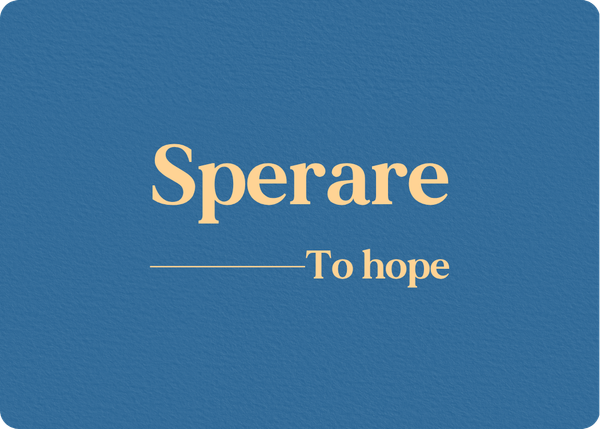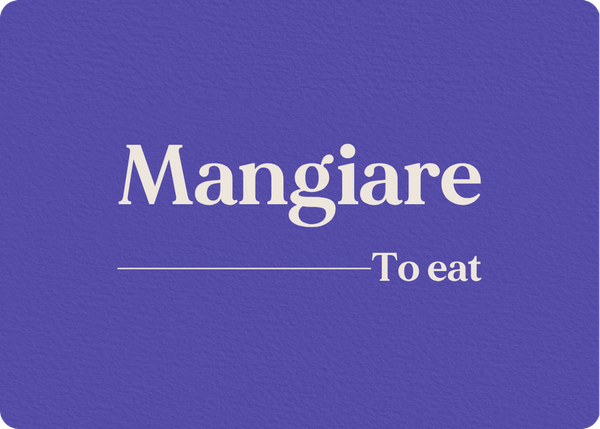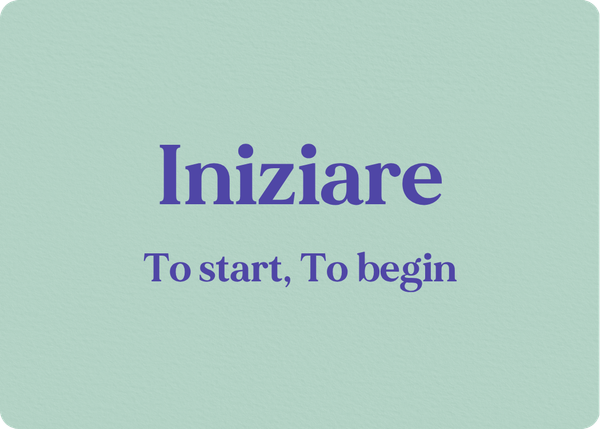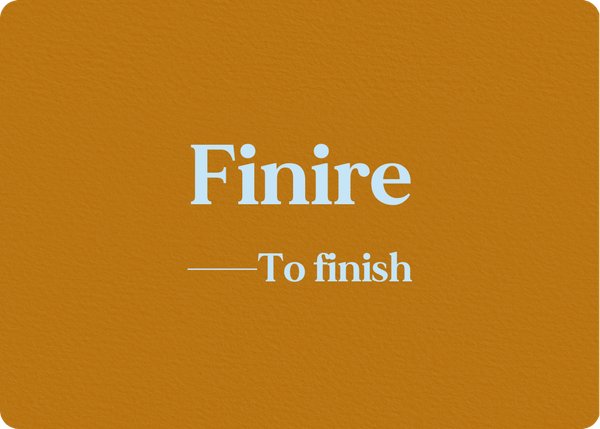What is Sperare?
Sperare is an Italian verb meaning "to hope", "to wish", or "to expect". It belongs to the first conjugation (-ARE verbs) and follows regular conjugation patterns. This verb is useful for expressing hopes and wishes, expectations, and desires for positive outcomes.
Key Features of Sperare:
- Type: Regular first conjugation verb (-ARE)
- Meaning: To hope, to wish, to expect
- Auxiliary verb: Uses "avere" (to have) for conjugation in compound tenses
- Past participle: Sperato
Indicativo – Indicative Mood
Presente (Present Tense)
| Person | Conjugation |
|---|---|
| io | spero |
| tu | speri |
| lui/lei | spera |
| noi | speriamo |
| voi | sperate |
| loro | sperano |
Example:
Spero che tu stia bene.
I hope you're well.
Passato Prossimo (Present Perfect)
| Person | Conjugation |
|---|---|
| io | ho sperato |
| tu | hai sperato |
| lui/lei | ha sperato |
| noi | abbiamo sperato |
| voi | avete sperato |
| loro | hanno sperato |
Example:
Ho sperato per tanto tempo che tornasse.
I hoped for so long that he/she would come back.
Imperfetto (Imperfect)
| Person | Conjugation |
|---|---|
| io | speravo |
| tu | speravi |
| lui/lei | sperava |
| noi | speravamo |
| voi | speravate |
| loro | speravano |
Example:
Da ragazza speravo di diventare una ballerina.
As a girl, I hoped to become a dancer.
Trapassato Prossimo (Past Perfect)
| Person | Conjugation |
|---|---|
| io | avevo sperato |
| tu | avevi sperato |
| lui/lei | aveva sperato |
| noi | avevamo sperato |
| voi | avevate sperato |
| loro | avevano sperato |
Example:
Prima di conoscere l’esito del test, avevano sperato in un risultato migliore.
Before knowing the result of the test, they had hoped for a better outcome.
Passato Remoto (Simple Past)
| Person | Conjugation |
|---|---|
| io | sperai |
| tu | sperasti |
| lui/lei | sperò |
| noi | sperammo |
| voi | speraste |
| loro | sperarono |
Example:
Sperammo fino all'ultimo che tutto si risolvesse.
We hoped until the end that everything would be resolved.
Trapassato Remoto (Past Anterior)
| Person | Conjugation |
|---|---|
| io | ebbi sperato |
| tu | avesti sperato |
| lui/lei | ebbe sperato |
| noi | avemmo sperato |
| voi | aveste sperato |
| loro | ebbero sperato |
Example:
Dopo che ebbe sperato a lungo, alla fine si arrese.
After he had hoped for a long time, he finally gave up.
Futuro Semplice (Simple Future)
| Person | Conjugation |
|---|---|
| io | spererò |
| tu | spererai |
| lui/lei | spererà |
| noi | spereremo |
| voi | spererete |
| loro | spereranno |
Example:
Spererò sempre nel meglio per te.
I will always hope for the best for you.
Futuro Anteriore (Future Perfect)
| Person | Conjugation |
|---|---|
| io | avrò sperato |
| tu | avrai sperato |
| lui/lei | avrà sperato |
| noi | avremo sperato |
| voi | avrete sperato |
| loro | avranno sperato |
Example:
Prima di rinunciare, avrà sperato in ogni possibile soluzione.
Before giving up, he/she will have hoped for every possible solution.
Congiuntivo – Subjunctive Mood
Presente (Present Subjunctive)
| Person | Conjugation |
|---|---|
| che io | speri |
| che tu | speri |
| che lui/lei | speri |
| che noi | speriamo |
| che voi | speriate |
| che loro | sperino |
Example:
Dubito che Silvia speri ancora in un cambiamento.
I doubt Silvia still hopes for a change.
Passato (Past Subjunctive)
| Person | Conjugation |
|---|---|
| che io | abbia sperato |
| che tu | abbia sperato |
| che lui/lei | abbia sperato |
| che noi | abbiamo sperato |
| che voi | abbiate sperato |
| che loro | abbiano sperato |
Example:
Credo che Marina abbia sperato davvero di farcela.
I believe Marina really hoped she could make it.
Imperfetto (Imperfect Subjunctive)
| Person | Conjugation |
|---|---|
| che io | sperassi |
| che tu | sperassi |
| che lui/lei | sperasse |
| che noi | sperassimo |
| che voi | speraste |
| che loro | sperassero |
Example:
Sarebbe bello se sperassimo tutti in un futuro migliore.
It would be nice if we all hoped for a better future.
Trapassato (Past Perfect Subjunctive)
| Person | Conjugation |
|---|---|
| che io | avessi sperato |
| che tu | avessi sperato |
| che lui/lei | avesse sperato |
| che noi | avessimo sperato |
| che voi | aveste sperato |
| che loro | avessero sperato |
Example:
Se avessi sperato di più, avresti lottato ancora.
If you had hoped more, you would have fought more.
Condizionale – Conditional Mood
Presente (Present Conditional)
| Person | Conjugation |
|---|---|
| io | spererei |
| tu | spereresti |
| lui/lei | spererebbe |
| noi | spereremmo |
| voi | sperereste |
| loro | spererebbero |
Example:
Spererei in una giornata di sole per il matrimonio.
I would hope for a sunny day for the wedding.
Passato (Past Conditional)
| Person | Conjugation |
|---|---|
| io | avrei sperato |
| tu | avresti sperato |
| lui/lei | avrebbe sperato |
| noi | avremmo sperato |
| voi | avreste sperato |
| loro | avrebbero sperato |
Example:
Avrei sperato in una risposta diversa.
I would have hoped for a different answer.
Imperativo (Imperative)
| Person | Conjugation |
|---|---|
| (tu) | spera |
| (lui/lei) | speri |
| (noi) | speriamo |
| (voi) | sperate |
| (loro) | sperino |
Example:
Spera sempre nel meglio!
Always hope for the best!
Indefinite Moods
Infinito (Infinitive)
- Presente (Present): sperare (to hope)
- Passato (Past): avere sperato (to have hoped)
Examples:
Non smettere mai di sperare!
Never stop hoping!
Mi pento di aver(e) sperato così tanto.
I regret having hoped so much.
Participio (Participle)
- Passato (Past): sperato (hoped)
Example:
Il risultato sperato è arrivato.
The hoped-for result arrived.
Gerundio (Gerund)
- Presente (Present): sperando (hoping)
- Passato (Past): avendo sperato (having hoped)
Examples:
Sperando in giorni migliori, continuo a lavorare.
Hoping for better days, I continue to work.
Avendo sperato tanto in un cambiamento, l’attesa mi è sembrata interminabile.
Having hoped so much for a change, the wait felt endless to me.
The verb Sperare at a glance: Key tenses you need
| Present | Present Perfect | Imperfect | Present Subjunctive | Imperfect Subjunctive | Present Conditional |
|---|---|---|---|---|---|
| io spero | io ho sperato | io speravo | che io speri | che io sperassi | io spererei |
| tu speri | tu hai sperato | tu speravi | che tu speri | che tu sperassi | tu spereresti |
| lui/lei spera | lui/lei ha sperato | lui/lei sperava | che lui/lei speri | che lui/lei sperasse | lui/lei spererebbe |
| noi speriamo | noi abbiamo sperato | noi speravamo | che noi speriamo | che noi sperassimo | noi spereremmo |
| voi sperate | voi avete sperato | voi speravate | che voi speriate | che voi speraste | voi sperereste |
| loro sperano | loro hanno sperato | loro speravano | che loro sperino | che loro sperassero | loro spererebbero |
Conclusion
Mastering the conjugation of "sperare" is essential for expressing hopes, wishes, and expectations in Italian. As a regular first conjugation verb, it follows standard patterns throughout all tenses.
Remember the key points:
- Uses "avere" as auxiliary verb in compound tenses
- Regular first conjugation verb (-ARE) with standard patterns throughout all tenses
- Past participle is "sperato"
- Used frequently in conversations about dreams, goals, and possibilities
Keep practicing with real sentences and contextual examples to master this fundamental Italian verb!





